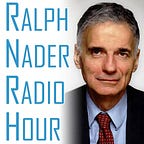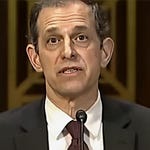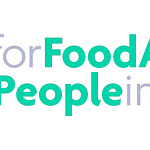Professor David Hemenway, the author of “Private Guns, Public Health” joins us to explain how we can reduce gun deaths if we treat the problem more like a public health issue, just like Ralph proved when dealing with the auto industry. Plus, Ralph weighs in on the repeal of the child tax credit, and Francesco DeSantis reports news items that tend to get ignored in the corporate media in our segment “In Case You Haven’t Heard.”
David Hemenway is an economist, Professor of Health Policy at Harvard University, and director of the Harvard Injury Control Research Center and the Harvard Youth Violence Prevention Center. He is a former Nader’s Raider, and he is the author of Private Guns, Public Health, and While We Were Sleeping: Success Stories in Injury and Violence Prevention.
Just by making it harder for criminals to get those guns, we have fewer criminals using those guns. That’s a fundamental law of economics and of psychology— if you don’t want people to do something, make it harder. If you want them to do it more, make it easier.
David Hemenway
The key about public health is: what we’re trying to do is prevent. Prevent. Prevent. Prevent. And too often, in the United States, what we try to do is blame. And often, blaming, all it does is say “Oh I don’t have to do anything. It’s somebody else’s fault.”
David Hemenway
[Reinstituting the Child Tax Credit] is something so simple, it’s something that helps so many families, it increases consumer demand because most of this money is spent on the necessities of life… and the Republicans are blocking it in Congress and not paying a political price. And that’s the story of the Democratic Party— they don’t make the Republicans, who are as cruel as any Republicans in history, pay a price.
Ralph Nader
In Case You Haven’t Heard with Francesco DeSantis
1. A Princeton University study, published at the end of August, traces the effects of unconditional cash transfers on homelessness. Focusing on Vancouver, Canada, researchers gave homeless people $7,500 Canadian. Conforming to the results of previous studies, the subjects used this money to get into housing – yet, what was remarkable about this study is it showed this program actually saved taxpayers money overall by relieving $8,277 per subject by removing them from the shelter system.
2. From Axios: 15 Senators have penned a letter to Secretary of State Anthony Blinken urging him to stop the planned admission of Israel into the Visa Waiver program. This program allows a country’s citizens to travel within the United States for 90 days without a visa. Built into this program is a provision demanding US citizens in a given country are treated equally – which is not the case for Palestinian Americans living in the West Bank. Israel claims that they are working to achieve compliance with this section of the law; however, this group of Senators argue that “There is no provision in law that provides that a visa waiver country can discriminate against certain groups of U.S. citizens for the first seven months of the program simply because a country claims they will treat all U.S. citizens equally for the last five months."
3. California Democrat Ro Khanna is making his pitch that President Biden should campaign on reelection on an anti-corruption platform, per the Huffington Post. Khanna, who previously chaired the Bernie Sanders campaign in California, has authored a five-point plan, consisting of “banning candidates for federal office from receiving donations from lobbyists or political action committees of any kind, banning members of Congress from trading stocks, limiting Supreme Court appointees to 18-year terms, imposing 12-year term limits on members of Congress, and requiring federal judges and Supreme Court justices to adhere to a new and more robust code of ethics.” Beyond the hard policy though, is a political point – Khanna argues “What we cannot allow to happen is for a former president ― twice impeached and four times indicted ― to position himself as the outsider in the race.”
4. On September 7th, General Motors submitted a proposal to the United Autoworkers in a near last ditch attempt to stave off a strike from the newly re-energized union. In response, UAW president Shawn Fain released the following statement, “After refusing to bargain in good faith for the past six weeks, only after having federal labor board charges filed against them, GM has come to the table with an insulting proposal that doesn’t come close to an equitable agreement for America’s autoworkers. GM either doesn’t care or isn’t listening when we say we need economic justice at GM by 11:59pm on September 14th. The clock is ticking. Stop wasting our members’ time. Tick tock.”
5. On September 10th, Senator Richard Blumenthal sent a letter to the Chair of the Federal Election Commission urging her to crackdown on “telemarketing calls and online scams that prey on [Americans’] goodwill and civic engagement,” noting that a recent charity scam defrauded consumers of over $150 million dollars, while a recent “network of scam…(PACs) took in $140 million.” Many speculate that Senator Blumenthal was spurred to act on this issue following the release of a documentary series on telemarketing scams focusing on the Civic Development Group, which raised vast sums for charities, which only received between 10 and 15% of that money. The Civic Development Group has itself been shut down by the FTC.
6. Labor journalist Michael Sainato reports that last week, the NLRB ruled in favor of the United Mine Workers of America, blocking Warrior Met Coal’s attempt to stage a decertification election at their Brookwood, Alabama facility. UMWA President Cecil E. Roberts is quoted saying the NLRB “based [its] decision on a ruling…that determined Warrior Met Coal...violated the law before the strike began, continue to violate the law today, and intend to keep violating it in the future.” The UMWA strike against Warrior Met is the longest coal strike in Alabama history.
7. The Intercept reports Rep. Andy Ogles, a Republican of Tennessee has introduced a new amendment to the NDAA which would bar the Pentagon from providing assistance to Pakistan amid the “ongoing crackdown by the military establishment and its civilian allies.” Pakistan has been experiencing political turmoil since the ouster of popular president Imran Khan on dubious legal grounds. Pakistan is a major recipient of US military assistance and the Biden administration has resisted attempts to reign in the ruling regime since Khan was deposed.
8. A new piece in Insider covers the clash of conservative and liberal populist Senators JD Vance of Ohio and John Fetterman of Pennsylvania. The two have been collaborating on rail safety legislation following the East Palestine derailment, and we have covered the degeneration of this legislation on the show before. Now, Vance is turning his attention to banning mask mandates, which Fetterman calls “silly performance art” which is taking time and attention away from the stalled rail safety bill.
9. Finally, a cover story in the Nation chronicles the “Confessions of a McKinsey Whistleblower.” The author was assigned to the McKinsey teams advising ICE and the Rikers Island prison, and he lays out how he tried and failed to resist the brutal and insidious nature of these institutions from inside the firm. The story is worth reading in its entirety to see behind the curtain of a firm which tries to wrap itself in platitudes like “Change the world. Improve lives.”













